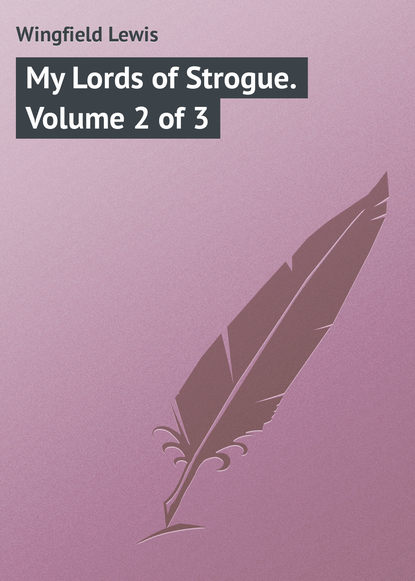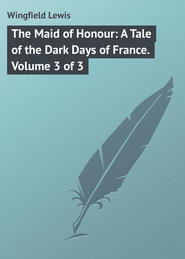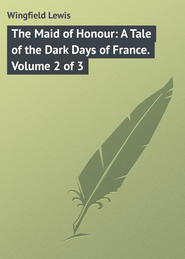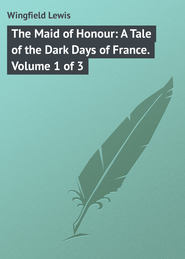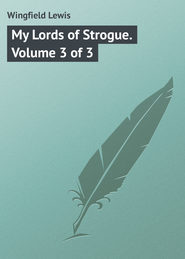По всем вопросам обращайтесь на: info@litportal.ru
(©) 2003-2024.
✖
My Lords of Strogue. Volume 2 of 3
Настройки чтения
Размер шрифта
Высота строк
Поля
'So Emmett's paper was to be stopped at last,' they said one to another. 'The only marvel was that it should have been permitted so prolonged an existence. The last mouth which had lifted up its voice to speak the truth was to be gagged. It was indeed time to draw the sword.
Then Robert proudly told of his expulsion from Alma Mater; of my Lord Clare's overbearing mien at the visitation; of the many warm hands which had gripped his, as, disgraced but proud, he quitted the quadrangle.
Tom, his eye kindling with emotion, laid his hand upon his younger brother's head.
'Robert,' he said, 'what e'er betide, if, in the conflict which is imminent, we two be separated, the one who survives will be proud of him who's fallen. We shall conquer. Erin shall be free! But many must first lay down their lives for her! I pray God that it may be His pleasure to spare yours!'
Robert turned white, though his heart was stout. He was brave with the highest of all bravery, for though the sight of a cut finger made him ill, yet was he determined now to face the sea of blood, if need were, without blenching. His was a higher courage than that common one which looks on danger without fear. He knew that in action he should be in mortal dread; but he knew too that, upheld by duty, he would nevertheless be always in the van. A thought crossed his mind which brought with it a momentary tremor. When the fiery cross was at last lighted-when the hands of kinsmen were at each other's throats-when Dublin was burning-her gutters running red-what would be the fate of delicate sensitive natures like that of Sara-of sweet, pale Sara Curran, round whose form his heart-strings were softly wrapping themselves? What if he were to fall? what if fortune should not smile upon the patriots? He was quite aware that Heaven frequently delights in persecuting those who do well, and showering favours on the most undeserving, almost offering a premium for evildoing. Therefore, however just the cause of Erin, it was possible that her probation was not over-in such a case what would become of Sara, and such as her? Dear gentle Primrose! He thrust the unwelcome thought aside. There were enough lugubrious subjects which might not be escaped, without wilfully conjuring up baleful images. He returned the pressure of his brother's hand, and with ardent eyes upraised, broke out into song once more, in which all joined solemnly, as though offering up a war-hymn:
'What shelter's right? The sword!
What makes it might? The sword!
What strikes the crown of tyrants down-
And answers with its flash the frown?
The sword!'
Truly there must have been something ill-omened about this special hymn. For the second time it served to cloak the advancing footsteps of the enemy. For the second time it was interrupted by the rap of the same unfriendly fingers.
Somebody was knocking-somebody gave the password 'Mr. Green.' It must be Terence. He had promised to come, in order that a military scheme of his might be discussed; one of which Emmett approved highly, though stupid Cassidy had affected to laugh at it. Certainly it must be Terence, who bade fair to become the leader they had all been sighing for so long in vain. Why did not some one run and open the door? It is but poor manners to keep a gentleman waiting in the street. Robert was hastening to do so-for he loved Terence dearly-when he was stopped by the old woman who kept the house.
'Whisht! Master Robert, darlint,' she said in a terrified whisper. 'Sure, I looked from the garret window and saw the glint of bayonets. For the love of the Holy Mother have a care!'
Swiftly the boy climbed the stairs and looked out. The hag's aged eyes had not deceived her. The street was surrounded by a cordon of soldiers, who stopped passengers at either end at the bayonet's point. A guard of yeomanry was stationed at the front door; another at the private back-entrance, which was accessible by a tortuous passage into a side-street. A short person with hooked beak, eyes too close together, shaded by brows which met in a tuft over his nose, was knocking. It was Major Sirr. How could he know of this back-entrance? How did he know that the watchword was 'Mr. Green'? There was of a surety hideous treachery somewhere!
Robert returned to his comrades and told them who was outside. Then Cassidy had been muddleheaded once again! The news he had brought was worse than none, for it was misleading. Instead of bidding them escape forthwith from Cutpurse Row, he had told them to avoid their homes. The houses was surrounded. The secret back entrance upon which they relied was known. Who was the Judas?
Having revealed so much, how much more might he not reveal? With troubled brain and clouded eye Tom Emmett looked on one and then another of the haggard faces before him.
The knocking continued. Some step must be taken. Happily half a dozen of the delegates were absent. The town-major might smoke out the nest. Some of the hornets were abroad. This was a mercy. The entire brood would not be taken. Who were the absent ones? Terence! Tom Emmett wrung his hands together as the light broke on him. How blind! It was to him Cassidy had vaguely pointed. What a snake in the grass, with his clever military plan and pinchbeck enthusiasm! Tom remembered now the behaviour of Miss Wolfe to her cousin at the ball. Her veiled warnings. She was as true as steel. Alas! She could aid them no longer with her counsels. She had seen through her cousin, and, her family feeling coming into jarring juxtaposition with her devotion to unhappy Erin, had retired from the field, too deeply wounded to take any further part in the affray. Yes! It must be Councillor Crosbie who was the Judas. Tom Emmett saw it now that it was too late. In a few hasty words he conveyed his impression to his brother.
Robert opened his mouth indignantly to defend the councillor; but he only sighed, for, from whatever side the treachery came, it was soul-wearing. His forebodings of a few minutes since crowded up again like visions in a nightmare. A pitfall had been cunningly prepared for the patriots to their undoing. A few were yet abroad who might take a responsible part, but this was a withering blow. Treachery? Of course there was. It was altogether a bewildering occupation to pass trusted characters and names in mental review with an eye to the detection of the traitor. That there was a traitor there could now be no doubt, but Robert swore to himself with sturdy faith, that, be he whom he might, his name was not Terence Crosbie!
The knocking became louder-more peremptory. There was no escape. There was nothing for it but submission. With dry lustrous eyes Tom Emmett bade his brother go and open the door.
There would be a trial-a court-martial. Vain mockery! Would the result be execution-or lifelong servitude-or banishment? The chief of the Irish Directory felt the humbling conviction that he was not fit for his post. Like Phæton he had leapt into the sun-chariot. He had been fooled and toyed with. The precious deposit whose care he had presumptuously accepted was shattered through his fault-yes-certainly through his fault. He should have been more cautious in accepting Crosbie's overtures. Precious lives would now be sacrificed-the cause gravely compromised, if not altogether ruined. Execution-lifelong servitude? How wildly did Tom Emmett long at this moment for the former-how gladly would he have hugged the rope-how joyfully would he even have walked to the riding-school where Beresford and his fellow-devils carried on their fiendish work! Any personal pain-the more poignant the more welcome! Anything which might rouse the hapless patriot from the grinding weight which crushed him now, as prone on his face he lay sobbing on a form.
Many an encouraging hand was laid upon his shoulder.
'Cheer up, man! we're in the same boat,' the delegates murmured. 'It's the chance of war-of an ignoble war waged in the dark against honest men by an ignoble adversary. Fortune is cruel to us; but we'll snap our fingers in her face. If we are to die, let us die as men-not in tears like women. Rouse up, Tom! rouse up, boy! Put on a good front. Open the door, Robert. If they have learned to probe thus deeply in our secrets, they will know more-enough to hang us every one. There's no good in battling with them.'
Major Sirr entered, and saluted his victims with one of the elaborate military evolutions which had become the vogue. Tom Emmett started from the form, and held himself erect. A paper caught his eyes. He clutched and tore it into fragments.
'Gentlemen, you are my prisoners!' Major Sirr said, with a portentous sword-wave. 'It's no good resisting. I'm glad to see you know better than to resist. Here is my warrant-made out in all your names. We will go, if you please, in the first instance to Castle-yard; then to Kilmainham, where you'll meet your friends.' He smiled at Tom Emmett with a sinister smile, and stirred the fluttering fragments of paper with his swordpoint. 'What's this?' he said, the tuft of eyebrows wrinkling down his nose. 'I know what it is-a list of your precious society, I dare say. Ye're mighty fond of waging war on paper, gentlemen! Look here now! All we want to know of ye we do know-or could speedily learn. I might have those bits picked up and glued together. But I won't, for 'tisn't worth my while. There! Come, gentlemen, march! Dease-where's Dease? I saw him but now. We mustn't lose him, for he's a docthor, and Kilmainham's terrible full of sick! Dease, where are yez? I have him on the list.'
But the delegate who answered to the name of Dease had no intention of visiting Kilmainham. Upon the first entrance of Sirr, he had withdrawn in the confusion to an upper room, and making use of his surgical knowledge, had severed the femoral artery. When the soldiers found him he was dying; which aggravated Sirr no little, who was proud of his masterly treatment of the hornet's nest.
'Come, put out a nimble leg!' he cried crossly. 'We've parleyed too long. To business! to business!'
Between a double file of soldiers the delegates were marched off, down several streets, to Castle-yard, while the populace looked on, dull-browed. They attempted no rescue. It is probable that few realised what band it was which was being thus openly conducted to its fate (many such bands passed along Dublin streets) – that few were aware that in this little knot were centred the hopes of deliverance for which all were praying.
They were gone. Only Robert Emmett and Major Sirr were left behind.
'Am I to go with you? I will go,' Robert said.
The major looked at him, and gave way to a sepulchral cachinnation. Then by his action he belied the language he had used just now. With the greatest care and deliberation he stooped and picked up the torn scraps of paper. When they were bestowed to his satisfaction in a wallet, he looked at Robert and laughed again, wrinkling his sinister eyebrow tuft:
'Adieu, my lad! and good luck!' he grunted. 'No, no! We don't want you yet, my little cockatrice! All in good time-when ye're fledged! Good-bye! or rather au revoir!'
CHAPTER VIII.
MR. CURRAN LEAVES PARLIAMENT
Major Sirr's ill-timed mirth rankled in Robert's bosom. He was not worth taking, then! Yet Lord Clare had deemed him dangerous enough to justify expulsion from Alma Mater. Lord Clare. What did he intend doing with this last haul of the net? That document which Sirr had picked up so carefully would provide him with such a list of country members as would satisfy for awhile even his rapacious gullet.
Would he hang them all, or be content, for the present, to cage them as he did before? No. Times were changed since then. He was deliberately scourging the land with scorpions. No mercy might be expected at his hands. Was Tom Emmett to be hanged? Was he to suffer an ignominious death before he had had time to strike a blow for motherland? That would be too hard. It must be prevented somehow. It was providential that the younger brother should not have been kidnapped too. It was a miraculous intervention, for duty shone clear before him. He must obtain the release of the patriots, even if to do so he should have to kneel at King George's feet. Intercession must be made. At the thought the lad's courage rose. He would go and consult Curran on the subject.
As he hurried on down Dame Street, he strove to comb his tangled thoughts into some symmetry. Who could the Judas be who wore his mask so deftly? Sirr's Battalion of Testimony was spreading to huge proportions; the Staghouse by Kilmainham, where the wolves dwelt, could scarcely hold them now. Doubtless there was a secret service as well as this public one so insolently flaunted.
'Of whom does it consist?' Robert kept asking himself. 'Of whom? The friends of our hearts-the wives of our bosoms. It is awful to think how, when a country is well stirred up, the mud will rise to the surface!' Then, ruminating as he went, he thought of Terence, and murmured mournfully, 'Could it be he? I pray not, for I love him as a brother!'
A shadow lay stretched before him. With a shudder he turned aside to avoid the effigy of a good man, who by a singular caprice of history has been elected high-priest of a mean purblindness, which he above all others would himself have most abhorred. William III.'s effigy, in its incongruous classical costume, is no whit more contemptible than some of his admirers have tried to make his character. But such is the way of the world. We set up a pole, and drape it with our own sentiments, then kneel down to worship, crying, 'How perfect is our idol!' Of course it is; for the drapery is woven, as a spider's web is, from out of our own bowels; what can be so perfect as that we have ourselves created, however loosely it may hang on the support we have selected to bear it?
Turning away from the Juggernaut of Orangeism, Robert beheld the subject of his thoughts, and the man of whom he was in search. Mr. Curran and his ex-junior were standing in earnest talk under the colonnade of the senate-house. The rush of events had changed both men even in their externals. The older one seemed shrunken and grey-skinned. His unkempt elf-locks were more wild, his uncleanly linen more disordered, his eye more bright and restless, than of yore.
Those who knew him well perceived that he was torn in sunder by two antagonistic selves. He yearned in secret for the success of the popular movement; he peered out anxiously for the first glimmering white sail in the offing; his soul bled for his country's misery; he longed to know precisely the patriot leaders' plan, that his keen brain might advise upon it-yet he railed at and derided those very leaders to their faces, spoke scoffingly of France, declared that all was hopeless; snapped up any incautious delegate who spoke to him too openly of the society.
The reason for his odd conduct is obvious. His judicial mind-expert in weighing evidence-had seen long ago that the combatants were ill-matched-that it was Honesty fighting against Guile. It was possible-just possible-that Heaven for once would change its usual tactics, and permit Honesty to come off the conqueror. It was possible-but oh, how improbable! Curran saw that so soon as Honesty had tumbled into the Slough of Despond, the firm grasp of a friend who was a paradox would be needed to pull him out; of one who should be protected by the glamour of his own virtue against the dagger of the murderer, even as medieval saints are mythically supposed to have been protected against the torments of the caldron and the wheel. Such a peculiar and delicate position Curran actually occupied.
As we have seen, he remained in close friendship with Emmett and the rest, and also with such important people in the opposite camp as the Glandores, without the faintest suspicion of treachery falling on him. He fearlessly rose and poured forth such denunciations against the executive in parliament, as would have brought any other man to Kilmainham and its minuet. But for all that, the informer dared not point his finger at him; even Lord Clare was convinced that he must be endured or bought-not browbeaten.
Once or twice he had been hustled in the street, but had curbed his peppery nature by a sublime effort. His life was of more value to his country than that of many drunken rufflers. He quietly refused to fight now with any such paltry ruffians.
Councillor Crosbie was more altered than his chief; the expression of his face was changed. As Robert surveyed it he endured the compunction of remorse, in that for an instant he had doubted him. If Doreen had not been perversely haughty, she could not have accepted her aunt's garbled tale so readily. But then her spirit was wrung awry by long-continued crooning over wrongs; and being unhealthily sensitive, was predisposed to look out for evil. She had seen so much trouble that she had come to believe there could be nothing else in store.
Terence's face had lost the open laugh of careless bonhomie which had vexed her-which was so well suited to its Irish cast of features-by which I do not mean the confined forehead and coarsely gaping mouth, which make many of our countrymen so uncomely-but the highly-coloured, cheery face, with ruddy lips, which when they are parted display a row of dazzling teeth. His eye, whose unruly dancing defied fate, was strangely at variance now with the moody brow, till lately so unwrinkled; while a reckless swagger, which was a new characteristic, spoke of a bitterness and chafing defiance which a green tabinet necktie, with bows ostentatively displayed, served but further to accentuate. He stood in earnest converse with Mr. Curran, who sourly shook his head. Just out of earshot faithful Phil leaned against the wall, firing-iron in hand, watching his master in his dog-like fashion-sporting also, in humble imitation, a rag of green about his neck.
Rapidly Robert unfolded his budget. The visitation at Trinity was mere child's play; not so this wholesale arrest. Even Curran forgot his customary caution, and put quick sharp questions as his face grew greyer. Emmett, Russell, Bond, were in prison, then. They would be tried-how? The law courts were closed and silent. By court-martial? Hardly. Lord Clare was too clever for that. Given the heads of a conspiracy who had grievously compromised themselves, he would of course get up a pompous series of mock state trials, with 'juries of the right sort' to bring the pageant to a predetermined end, and so justify and whitewash his arbitrary acts in the world's eyes. This was what he would do.
'The patriots should be defended!' Curran swore. He would defend them himself, no matter at what personal risk; in spite of any amount of threatening. The bursts of eloquence which before now had startled his audience to conviction, should be nothing to the burning words by which he would wring these unselfish lives from the jaws of death.
It was for this that he had rested on his oars so long. He had defended many of the proscribed with varying success. But these were the chiefs, the head and front of the offending. He felt that the power was there, a precious gift direct from God. He would blast the witness, whoever he might be, as he sat upon the table, till even a jury of the right sort would not dare to convict upon his evidence; he would paint in vivid colours what he and his fellows were-wretches who, buried as men, had slept in the tomb till their hearts festered and dissolved-to be dug up thereafter as informers.
He bade Robert be of good cheer, and listened, with a kindly arm about the lad's neck, to his project of going to England. He would go to the fountain-head, vowed Robert, for no mercy could be expected here; he would waylay Mr. Pitt himself-would force himself into the Royal presence-would compel England to listen to a recital of her sister's tribulations. The English could not know what was going forward-the King, whom people dubbed good King George, could not know of it. If he did, he was a hypocrite who ought to be unmasked-but of course he did not. The ardent lad quivered with excitement and noble fervour, while the little lawyer felt himself invaded by pity. The poor boy persisted in believing that Right was sure to triumph. He believed that his story would rouse the English to interference-Mr. Pitt to contrition for excessive sinfulness-that it would melt like snow the prejudices of the most ignorant and pigheaded monarch who ever occupied a throne. Poor lad! In spite of all he saw, his illusions had not yet been taken from him. Some people require an operation with pincers. The dreadful moment had yet to come when he would wake up and know with certainty that his doll's inside was bran.
'My boy,' the lawyer said, 'the impulse is excellent. Go, and prosper, if the Fates will it so. To tell the truth, I believe more in my powers of oratory here than yours over yonder. I ought to have special interest in you,' he pursued, with a sad smile, 'though it's to the lowering of my own conceit. I made the discovery this morning-what owls we old fogies are! – that it is not for the sake of my brilliant conversation that you young butterflies choose to flutter about the Priory. Upon my word, I used to think it was, and that your taste was vastly fine.'
Robert's face assumed a guilty hue, and he lowered his eyes.
'Nay-don't blush, man!' returned the elder, whilst Terence looked from one to the other curiously. 'When the spring comes, birds will mate even on battle-fields! The perseverance of nature, despite obstacles, is incorrigible! Would ye believe it, Terence? A girl to whom I'm a bit partial flung herself into my arms this very morning with shrieks, declaring that if all a foolish servant told her was true, and Ireland doomed to be a slaughter-house, one crathur at least must be saved-who was not her papa! She expects me, I suppose, to build an ark for this new deluge, and take in of every animal two after his kind.'





